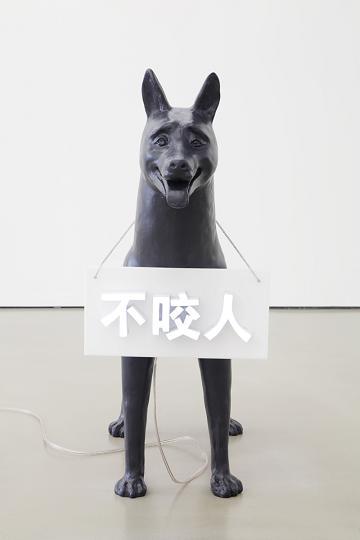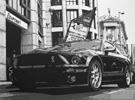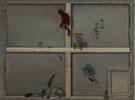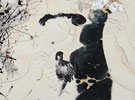
展览时间:2012-05-13 ~ 2012-06-17
展览地点:空白空间
参展艺术家:王书刚
开幕时间:2012-05-12 15:00
展览介绍:
王书刚(1960年生)此次个展的关注重点在于其作品的观念性。其限量版青铜雕塑系列有着相似的人物造型,这一点与许多同时代的中国艺术家相同,所关注的中心思想均围绕个体与社会展开。王书刚以嘲讽和性为引,以艺术创作为手段,演绎社会结构与社会范式的变迁。
灯箱字装置以微妙手段描述与质疑当下。"在这个国家只有你想不到的,没有你做不到的"--其意所指,不言自明。
《狗》的面部表情如此无辜天真,夸张的令人发指--实在是太人性化了。然而,就算挂上"不咬人"的牌子,也无法减轻人对狗的不信任感:那毕竟是狗的天性。《狗》所提出的问题是:谁服从谁,威胁如何隐而不现,又如何面对这种情况--超出中国现状的重要问题。
《草泥马》是貌似羊驼的动物,背上的裸身骑者有如耶稣莅临耶路撒冷,雄奇伟壮,这感觉不单纯是比例大小的问题。作品名称来自网络流行语,是以谐音异形手法,自国骂生出的虚构物种,这类手法在国内广泛用于规避网络审查机制。淫荡坐姿的人与子虚乌有的兽,呲牙怪笑,赤裸裸的嘲弄与直白自信的回应了此类制约机制。
展览题目《围观》意指一般条件的主题性汇总与观察,特别是有关社会环境的观点所体现出的内省自察。
For this exhibition of Wang Shugang (*1960) at Alexander Ochs, the conceptual approach of the artist is brought to the center of attention through the series of works exhibited. With his smaller scale bronze cast figures of seemingly uniform serial portraits, Wang joins many Chinese artists of his generation concerned with the central theme surrounding the individual and society. Wang uses the play, often with ironic and sexualized references, to serve as an indicator for the social structure and social paradigm shift in his country.
Wang's neon letter installation gives insight into the subtlety with which he describes existing conditions and actively put these into question. The seventeen Chinese characters can be translated into: 'In this country, there are only things you cannot imagine - but nothing you cannot do!' Even if 'this country' is not named directly, the lettering alone makes the reference to China easily recognizable and remains untold enough to allow for the mental transfer.
The facial features of the dog display an expression of submissive innocence that through its exaggeration could cause skepticism at first - this animal seems to be all too human. Around the neck of the sculpture, three neon characters suggest that this dog does not bite humans. This indication does not alleviate the distrust that is triggered by the mannerism of the dog. Dog raises questions: Who is subordinate to who, how threats are veiled on the outside and how to confront this situation - questions, that are relevant beyond the situation in China.
The bronze sculpture Cao Ní Ma, is a llama-like animal with a naked rider which resembles representations of Christ's entry into Jerusalem more than a grand equestrian statue, and this not merely through its proportions. The title of the sculpture translates literally into 'Grass-Mud-Horse', however with almost the same pronunciation and written with different characters, it can translate to 'Fuck Your Mother'. This transcribed insult formula is well-known in China in regards to Internet censorship and its circumvention. The grin of both the animal and the man in his lascivious sitting position underlines the brazen mockery of and self-confident response to such restrictions.
The exhibition title, Wei Guan, which means to 'encircle' or 'look', refers to the thematic encirclement of the conditions in general and more particularly to the introspective look that the view on the social environment incorporates.
- 2012-04-20 ~ 2012-06-02杯弓蛇影:马轲个展
- 2012-04-15 ~ 2012-05-152012花花斑马-星球寻幽
- 2012-04-22 ~ 2012-06-17成勇个展
- 2012-05-10 ~ 2012-05-13策展人在哪里——韩国著名策展人李圆一摄影遗作展
- 2012-05-18 ~ 2012-05-21荷塘——陆春涛新作展
- 2012-05-01 ~ 2012-06-15通往前线的道路——韩柯绘画展
- 2012-06-01 ~ 2012-07-08仓库总动员
- 2012-05-12 ~ 2012-07-01差异的共振:李超/王亚彬作品展
- 2012-05-12 ~ 2012-05-20弗拉基米尔·加宁“和为贵”油画作品展
- 2012-05-15 ~ 2012-09-09诚恳的承诺——Jules de Balincourt个展










